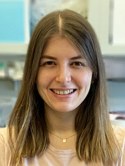Amino acid intake strategies define pluripotent cell states Journal Article
| Authors: | Todorova, P. K.; Jackson, B. T.; Garg, V.; Paras, K. I.; Brunner, J. S.; Bridgeman, A. E.; Chen, Y.; Baksh, S. C.; Yan, J.; Hadjantonakis, A. K.; Finley, L. W. S. |
| Article Title: | Amino acid intake strategies define pluripotent cell states |
| Abstract: | Mammalian preimplantation development is associated with marked metabolic robustness, and embryos can develop under a wide variety of nutrient conditions, including even the complete absence of soluble amino acids. Here we show that mouse embryonic stem cells (ESCs) capture the unique metabolic state of preimplantation embryos and proliferate in the absence of several essential amino acids. Amino acid independence is enabled by constitutive uptake of exogenous protein through macropinocytosis, alongside a robust lysosomal digestive system. Following transition to more committed states, ESCs reduce digestion of extracellular protein and instead become reliant on exogenous amino acids. Accordingly, amino acid withdrawal selects for ESCs that mimic the preimplantation epiblast. More broadly, we find that all lineages of preimplantation blastocysts exhibit constitutive macropinocytic protein uptake and digestion. Taken together, these results highlight exogenous protein uptake and digestion as an intrinsic feature of preimplantation development and provide insight into the catabolic strategies that enable embryos to sustain viability before implantation. © 2024, The Author(s), under exclusive licence to Springer Nature Limited. |
| Keywords: | mitogen activated protein kinase; controlled study; gene sequence; human cell; nonhuman; flow cytometry; cell proliferation; mass spectrometry; proteins; animal cell; mouse; animal; metabolism; animals; mice; cell viability; gene expression; embryo; embryonic stem cell; protein; cell differentiation; fibroblast growth factor 2; immunocytochemistry; mammal; glycogen synthase kinase 3beta; protein transport; embryonic stem cells; teratoma; amino acid; real time polymerase chain reaction; pluripotent stem cell; amino acids; leucine; mammals; fluorescence activated cell sorting; cell metabolism; hydrolysis; octamer transcription factor 4; methionine; lysine; transcription factor nanog; preimplantation embryo; lysosome; blastocyst; kruppel like factor 4; colony formation; leukemia inhibitory factor; bright field microscopy; macropinocytosis; mouse embryonic stem cells; octamer transcription factor 2; human; male; female; article; amino acid transporter; cell viability assay; mouse embryonic stem cell; panc-1 cell line; p21 activated kinase 1; octamer transcription factor 6; amino acid intake |
| Journal Title: | Nature Metabolism |
| Volume: | 6 |
| Issue: | 1 |
| ISSN: | 2522-5812 |
| Publisher: | Nature Publishing Group |
| Date Published: | 2024-01-01 |
| Start Page: | 127 |
| End Page: | 140 |
| Language: | English |
| DOI: | 10.1038/s42255-023-00940-6 |
| PUBMED: | 38172382 |
| PROVIDER: | scopus |
| PMCID: | PMC10842923 |
| DOI/URL: | |
| Notes: | The MSK Cancer Center Support Grant (P30 CA008748) is acknowledged in the PubMed record and PDF. Corresponding MSK author Lydia W. S. Finley -- Source: Scopus |
Altmetric
Citation Impact
BMJ Impact Analytics
MSK Authors
Related MSK Work














